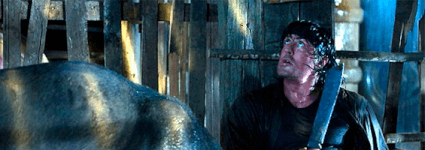First Blood is one of the highlights of Sylvester Stallone's career, giving him room to showcase his dramatic talent as a Vietnam War veteran who, years after returning to the USA, feels segregated from the rest of society. Based on David Morrell's book, the feature film is a strong critique of how veterans were treated in the country and the war itself. It is worth noting that this was the first major feature film by Orion Pictures, which, besides the two sequels to the Rambo saga, also released titles like Amadeus, Platoon, Robocop, and The Terminator.
After the success of First Blood, none other than James Cameron (creator of the Terminator franchise) was called to write the sequel's screenplay, alongside Sylvester Stallone. Hence, the film dives deeper into action. Besides criticizing the armed conflict in Asia and the treatment of veterans, the story also condemns the military and government stance. On the other hand, Rambo: First Blood Part II displeased many critics – even “winning” the Golden Raspberry Award for Worst Picture in five categories (including Worst Picture). In other words: watch it, but don't expect much more than a typical 1980s action movie.
The third part of the Rambo franchise in theaters. This time, the character goes to Afghanistan during the Soviet invasion in a story with even more action, practically forgetting the Vietnam War criticisms (mainly seen in First Blood) and seeking to "expose" the Russians' actions in the Middle East – which, in today's eyes, seems quite hypocritical. Even so, the film delivers more sequences of Sylvester Stallone shooting, punching, stabbing, and blowing up enemies, which alone ensures some unpretentious fun.
Twenty years after the release of Rambo III, Sylvester Stallone returned to the iconic role of John Rambo once again – besides sitting in the director's chair and writing the screenplay. In the story, we find the Vietnam War veteran once again trying to lead a peaceful life in Thailand but ends up involved in a nearby conflict. Uneven and lacking the positive points of the first film (the critique of the war and the way veterans are treated) and the second (1980s-style action), Rambo IV explores excessive violence, bordering on gore – perfectly delivering what fans of "no-limits" action want to see. The result is a feature film that displeased critics but made many long-time fans happy.




